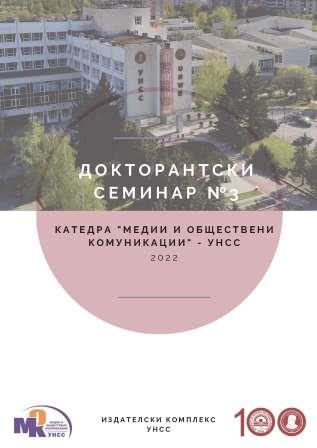РОЛЯТА НА ПРОДУЦЕНТ „НОВИНИ” В УПРАВЛЕНИЕТО НА ИНФОРМАЦИЯТА В КОНТЕКСТА НА ВОЙНАТА В УКРАЙНА
THE ROLE OF THE NEWS PRODUCER IN INFORMATION MANAGEMENT IN THE CONTEXT OF THE WAR IN UKRAINE
Author(s): Boryana Raycheva-Danailova
Subject(s): Communication studies
Published by: Университет за национално и световно стопанство (УНСС)
Keywords: emergency situation; war; conflict; propaganda; fake news; misinformation
Summary/Abstract: The modern media space operates in conditions of excessive speed of the communication process, creating "waves" of information noise. The boundaries between truth and falsehood are becoming increasingly blurred, and the media field is becoming a convenient space for the emergence of fake news and propaganda, which are a real weapon in times of military conflict.The relevance of the chosen topic is dictated by the need to rethink the new social role faced by the producer of "News" in information management in the context of new geopolitical challenges. In the analysis, the author refers to the topic of the war in Ukraine and its media coverage. The objectives of the development are to try to define the producer of news on television, to set and analyze the need to build information security in making management decisions of the producer of "News" in an emergency situation (such as war), to the main problems and challenges faced by the modern consumer oversaturated with contradictory information are indicated; The research methodology is a complex approach, including systematic, comparative and content analysis. In the present study the concepts of fake news, misinformation, overinformation, propaganda and others are considered. The challenges for the producer of "News" are related to the need to remain faithful to journalistic ethical norms, and his decisions in covering events to be a guarantor of objectivity, criticism, credibility. Restrictions on media channels hinder access to information, which makes it difficult to present different points of view, which poses a direct threat to information security. Suspension of access to certain national media (under the pretext of propaganda) "mythologizes" the country in question in the conflict and could lead to an undesirable effect -the search for alternative, unverified sources of information, which calls into question the motivation of the media in presenting the information.
- Page Range: 3-26
- Page Count: 24
- Publication Year: 2022
- Language: Bulgarian
- Content File-PDF

